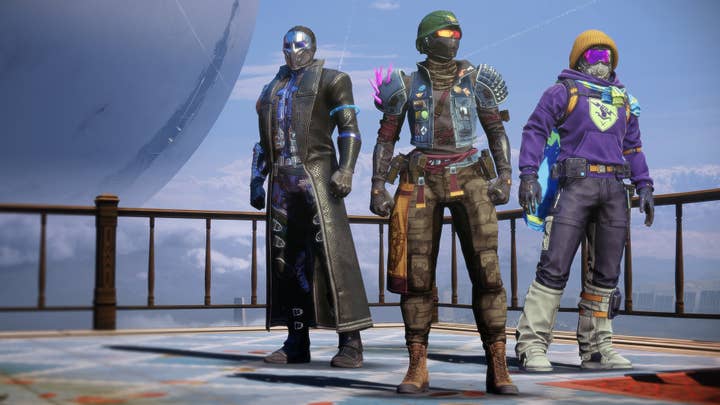Buying Bungie marks a strategic shift for Sony | Opinion
The $3.6 billon isn't just about competing with Xbox -- it's a sign of how Sony sees itself and the industry evolving
The announcement that Sony is buying Bungie for $3.6 billion came in just under the wire and wrapped up a record-breaking month for acquisitions in the games industry.
It's not a deal remotely on the scale of Microsoft's acquisition of Activision Blizzard King, of course, but it's further evidence of a major consolidation trend -- one that's likely to continue over the course of the year as Sony continues to expand its publishing and development operations.
It's tempting to consider this deal solely in the context of Sony's competition with Microsoft -- it's not a "response" to the ABK deal specifically, since Sony's negotiations with Bungie would already have been well underway before that deal was announced, but for several years there's been an overall sense of platform competition heating up and acquisitions being a key part of any effective strategy.
Looking at the Bungie deal solely in that context, however, risks missing the wider picture in terms of what this acquisition means for Sony's long-term strategy. Bungie isn't a standard studio acquisition along the lines of those Sony has made pretty regularly in the past decade; it's a company with a pretty significant multi-platform self-publishing capacity, a very popular and successful live service game that's been up and running for several years, and at least one more major title in the pipeline.
This acquisition represents a much more significant strategic shift for Sony than any prior studio acquisition
Sony has made it clear that it's not going to be stripping back any of that or turning Bungie into another of its (largely excellent) first-party studios. The Destiny firm will operate with a high degree of independence and continue to publish its games as cross-platform titles.
From Bungie's side of things, this seems as close to ideal as any acquisition can be. More than just the money (which is always nice) and the promise of independence, the deal also looks like a really good cultural fit that ought to end up being good for Bungie and its games. Bungie has been through quite a few different arrangements in terms of owners and publishing partners over the years; it was part-owned by Take Two way back in the mists of time before being fully owned by Microsoft, splitting off to become independent, signing a long-term publishing deal with Activision Blizzard and then finally becoming a self-publishing operation just a few years ago.
Each of those arrangements has had positives and negatives for the company, and to some extent Destiny and Destiny 2 reflect the issues it had with its most recent setups; while the game has consistently been of very high quality, especially in terms of the nuts and bolts of how it works as a shooter (Destiny 2 having the best second-by-second gameplay of any contemporary FPS is a hill I'll die on), it's shown signs of being pulled in different directions over its lifespan.
Activision Blizzard may have been an effective editorial voice in some regards when it was publishing the game, but also seems likely to have been at least partially responsible for pushing Destiny towards monetisation models that didn't really work for this kind of game and audience. Once Bungie was self-publishing, the business model became better-tuned for the game's audience, but the lack of a publisher's editorial input is also evident -- every great creative needs a great editor to ground them, and while Destiny has always been an obtuse game in some ways, recently the unusual structure and approach which was part of its charm has increasingly often turned into being outright unwelcoming to new or returning players -- exactly the kind of misstep that good-quality publisher input can often help with.

Sony is one of the best partners Bungie could hope for in this regard. It's got an excellent track record in recent years of taking a long view of its studios' IPs, which usually leads to prioritising quality (and thus long-term value) over short-term profit -- which is evident in the company's general refusal to engage with fast-buck monetisation approaches, and its willingness to allow games enough time in development to bring them up to scratch.
Sony knows it can't remotely challenge Microsoft in a spending war, but even if Xbox and Game Pass become dominant, it would still be one of the biggest and most important publishers
They're not always perfect and there have been missteps and rough patches, but in general studios within the Sony group seem to get excellent editorial and technical assistance from the company while still retaining the freedom to make their games unique and interesting. Of course, we can't definitively say that being bought by Sony will make Destiny (or the upcoming Matter) into better games, but at the very least this deal should create positive conditions for that to happen.
From Sony's side of things, this acquisition represents a much more significant strategic shift than any prior studio acquisition -- it's a major step forward in the company's cautious embrace of cross-platform publishing (which has thus far largely consisted of some well-received PC versions of key PS4 titles), and the ultimate aim seems to be to make live service games into a major new pillar of the PlayStation business.
It's worth pointing out, of course, that there's really nothing new under the sun. From the mid-1990s through to 2015, Sony owned one of the most groundbreaking and prolific creators of service games, Sony Online Entertainment, which ran service games like EverQuest, PlanetSide, Star Wars Galaxies and The Matrix Online.
Few of the staff who guided SOE's success are still at Sony, of course -- SOE itself became Daybreak Game Company when it was spun off as an independent business in 2015 -- but we're not talking about ancient history here, as Sony was still running a major PC service games operator a few years after the launch of the PS4. Sony's acquisition of Bungie reflects an ambition in service games that may feel new, but actually dates back to the 1990s and co-existed with the PlayStation business for two decades.
This time, of course, is a little different. Bungie's own games will continue to be fully cross-platform, and it seems likely that Sony's other live service games will be on both PlayStation and PC, but crucially, PlayStation will be at the very least a co-equal platform for all of these titles, unlike the SOE era when most of the service games were PC-only.

The idea behind this business is mostly quite different from the other Sony studios -- it's not primarily designed as a way to drive consumers to the PlayStation platform -- but it will also certainly not function to drive consumers away from PlayStation. Even if other platforms are treated equally on paper, it seems pretty likely that PlayStation will always get one of the, if not the, best version of any given game.
This isn't just a battle between chequebooks; it's between ideas of how the future will shape the industry, and live services are important pieces on this game board
Rather than driving the success of the PlayStation hardware business, this major investment in live services is designed to further expand Sony's position as a publisher of software -- which is not necessarily distinct from its position as a platform holder, but is slowly evolving into an interesting variation of Microsoft's vision of the Xbox / Game Pass platform-as-service future.
The other shoe will drop soon, I expect, in the form of whatever service offering Sony is creating in response to Game Pass -- but the future vision that's taking shape so far is of a world where Sony is one of the premier publishers and operators of games, with PlayStation being one possible hardware platform (albeit a high-quality and desirabl one) where you can play those games.
The effect of this would be a little less dramatic than the radical change to the industry Microsoft is pushing for; but one key change would be that Sony's PlayStation business becomes far less cyclical as hardware becomes a smaller part of a business mix that would include a lot of games whose revenues carry on full-steam through hardware transitions and console cycles.
It's worth adding that there's some bet-hedging in this strategy too -- Sony knows that if this really becomes a spending war, it can't remotely challenge Microsoft's war chest for acquisitions, but even if Xbox and Game Pass become dominant, Sony would have a position as one of the biggest and most important publishers of game software to fall back on. That may be a far cry from its roots in consumer electronics, but it's not a bad consolation prize.
Up to this point, the conventional narrative of this console generation has pithed Sony as the standard-bearer for a traditional industry model -- console generations, monolithic software releases, and so on -- in the face of Microsoft's attempts to move everything to a new model. That's never been entirely true, and the Bungie acquisition makes it very clear that it's now not true at all; Sony has its own future vision, and while it may not be as all-encompassing as Microsoft's just yet, the company absolutely doesn't expect the world to stand still around PlayStation.
What's being set up here isn't just a battle between chequebooks; it's a battle between different ideas of how the future will shape up for the industry as a whole, and live service games are being set up as very important pieces on this game board.
